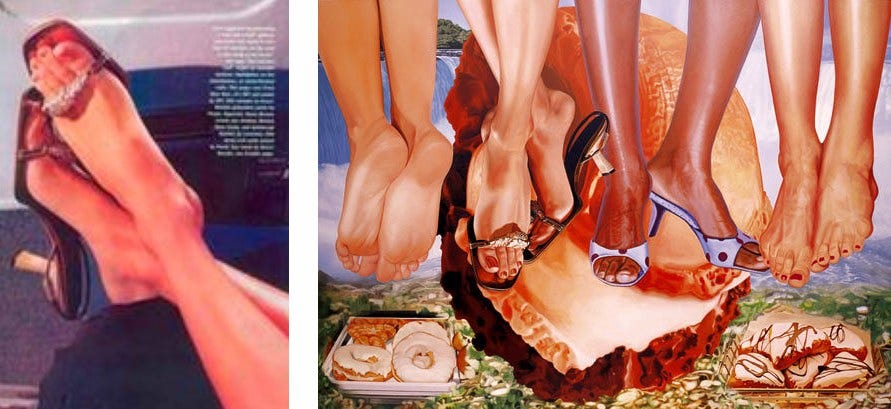Cases study 2 : Jeff Koons vs. Andrea Blanch ( 2006 )

Case
A famous visual artist, Jeff Koons, made a collage using various photographs for an exhibit commissioned by the Guggenheim.
Koons is being accused for copying part of a photograph taken by Andrea Blanch, a fashion photographer.Blanch's photograph appeared in the fashion magazine Allure, and depicts a woman's legs reclining on a man's lap in an airplane cabin. Koons cropped and re-oriented the photo, before including it in a painted collage among other pairs of women's legs. Blanch bring the case to the court.
Held
The judge found Blanch did not have the copyright over the Gucci sandal therefore the only thing that could be copied was the females leg which could not be deemed original in order to be protected by copyright. The district court granted Koons holding that the use of Blanch's photograph in his collage constituted fair use, and not copyright infringement.
Copyright Act 1987 Section 36(1)
The Copyright Act 1987 states that an infringement occurs when a person does something without the licence or permission or consent of the copyright owner.
The copyright in a work is infringed when a person who:
(i)not being the owner of the copyright
(ii)without consent or license of the owner of the copyright,
Copyright Act 1987 Section 13(2)
Certain conduct will not be considered as infringement of copyright. This provision provide defences to any allegation of infringement.
FAIR USE
Where a copyrighted material is used for for purposes of non-profit research, private study, criticism, review or the reporting of current events. If such use is public, then it must be accompanied by an acknowledgement of the title of the work and its authorship.
Point of View
In its most general sense, a fair use is any copying of copyrighted material done for a limited and “transformative” purpose. It can be done without permission from the copyright owner. In other words, fair use is a defense against a claim of copyright infringement. If your use qualifies as a fair use, then it would not be considered an infringement. Based on the case above, Blanch v. Koons, Koons just used Blanch’s idea partially to create a new artwork for himself. Hence, his use is qualified as a fair use, therefore that is not an infringement. For an example, DJ from hits.fm loves to do parody songs by using different types of songs by different artists. They did not copy the entire musical work to create their own ones but to transform it with limitation.
References
http://ncac.org/resource/blanch-v-koons
https://cpyrightvisualarts.wordpress.com/2011/12/20/jeff-koons-vs-andrea-blanch/
http://ncac.org/resource/significance-blanch-v-koons
Comments
Post a Comment